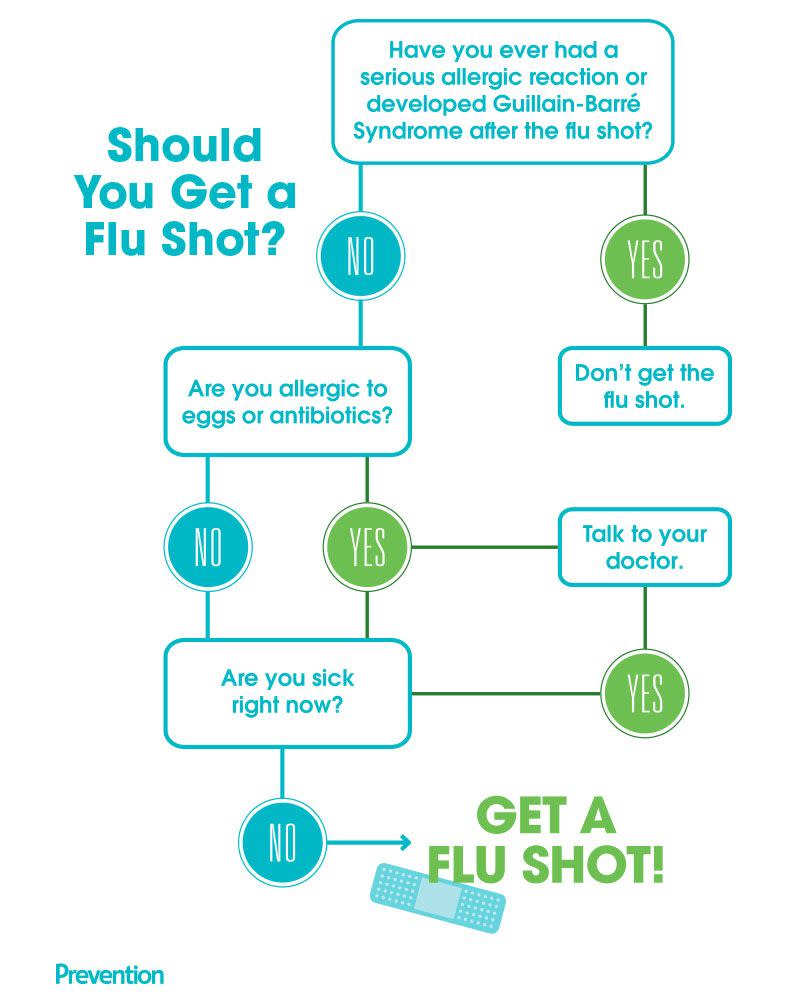There’s Only a Small List of People Who Shouldn’t Get a Flu Shot, According to Doctors

This article was medically reviewed by Raj Dasgupta, M.D., an assistant professor of clinical medicine and a member of the Prevention Medical Review Board, on August 6, 2019.
Let’s be clear: Just about everyone benefits from getting a flu vaccine. The Centers for Disease Control and Prevention (CDC) says it’s much safer to get vaccinated against the influenza virus than to roll the dice and risk infection.
Flu vaccines spare millions of Americans each year from potential suffering, hospitalization, and even death due to the flu and its complications.
That said, the CDC cites a handful of exceptions to the rule. People with specific health conditions and the very young are on the short list of those who should not get the flu vaccine. Plus, there are some people who should completely avoid the nasal spray flu vaccine.
Not sure where you stand? Here are the people that need to steer clear of the flu shot, how the vaccine may affect them, and other measures to take to prevent the flu.

✔️ People with life-threatening allergic reactions to the vaccine
If you’ve had a previous life-threatening reaction to the flu vaccine or its components—such as gelatin, antibiotics, or other ingredients—you should skip the flu vaccine, the CDC cautions. The worry is that it could happen again, but anaphylaxis—a sudden and potentially fatal, body-wide reaction—is exceedingly rare.
“I’ve been practicing for 30 years. I’ve never seen an anaphylactic reaction to the flu shot,” says Sandra Kemmerly, MD, an infectious disease specialist and system medical director for hospital quality at Ochsner Health System in New Orleans.
As for those with an egg allergy, the federal health agency’s advice is slightly different. While most (but not all) types of flu vaccine contain egg protein, people with egg allergies can still get vaccinated, the CDC says. If you have a history of severe egg allergy, meaning you get more than just a case of the hives when you’re exposed to egg, you should receive your vaccine in a medical setting so that you can be monitored.
“The recommendation to providers is if you’re going to give the flu shot to someone who’s got an egg allergy, you should be prepared just in case,” explains Sean McNeeley, MD, board president of the Urgent Care Association and medical director at University Hospital Urgent Care Network in Cleveland.
Of course, if you or a loved one is extremely allergic, speak up. “If you’ve had anaphylaxis, you better be talking to your doctor about the risks and whether you should get [the flu vaccine],” Dr. McNeeley says.
✔️ People with Guillain-Barre syndrome
The CDC says some people with a history of Guillain-Barre syndrome (GBS) should not get a flu vaccine. GBS is a neurologic condition that attacks the peripheral nervous system, causing muscle weakness and, in severe cases, paralysis. “If you’ve had Guillain-Barre, you know that you’ve had it. It’s very rare,” Dr. McNeeley explains.
Although the exact cause is unknown, two-thirds of people with GBS develop symptoms after they get sick with diarrhea or a respiratory illness, the CDC says. Certain bacterial infections or having the flu can also lead to a GBS diagnosis.
Some people have also developed GBS after getting vaccinated, but this is very rare. For every million doses of flu vaccine administered, only one or two people develop GBS, according to the CDC. If you have a known history of GBS, talk to your doctor before getting the flu shot.
✔️ Infants under 6 months old
The flu vaccine isn’t approved for babies under 6 months of age. That’s one reason it’s so important for pregnant women to get their flu vaccines.
“If the mom gets the flu shot and an infant is within, say, 3 months old, the infant should have circulating maternal antibodies,” and that should provide at least some partial protection against influenza, Dr. Kemmerly says.
These little ones are still at high risk of developing serious flu complications. That’s why caregivers and other family members need their shots, too. Dr. McNeeley’s infant grand-nephew isn’t old enough to get the flu shot, but “everyone who goes into that house better have their shot for two weeks or they’re not allowed in,” he says.
✔️ People who are extremely ill
Being sick—say, you have a very high fever, pneumonia, or have been admitted to the hospital—isn’t an excuse to skip your flu shot altogether, but it may be smart to wait until you fully recover.
If you get your flu shot when you’re very sick, the vaccine may not be as effective and it can prolong the amount of time it takes you to get better, explains Dr. McNeely, since your body is trying to fight your illness and build up enough antibodies to fight the flu.
However, once you have recovered, you should go ahead and get your flu vaccine with an okay from your doctor. If you simply have a cold—say, a mild case of the sniffles—it’s better to just go ahead and get your shot so your body has time to build resistance to the flu ASAP. Talk to your doctor about your symptoms before getting vaccinated if you have any concerns.
✔️ Certain people need to avoid the nasal flu vaccine
The nasal spray-mist type of flu vaccine is an option for some people ages 2 to 49 years old, as long as they’re healthy. It contains live virus and is not recommended for certain people, including:
Children younger than 2
Adults 50 and older
Pregnant women
People with a history of severe allergic reaction to a previous flu vaccine or any vaccine ingredient
Children 2 to 17 receiving aspirin or medicines containing salicylate (an aspirin ingredient used for relieving pain or inflammation)
People with weakened immune systems, such as those with cancer
Children 2 to 4 years old with asthma or a history of wheezing in the past year
People who have taken antiviral drugs for the flu within the past 48 hours
People who care for extremely immune-compromised patients (unless they avoid any contact with these people for 7 days after getting the nasal flu vaccine)
The CDC advises certain others to talk to their doctor before opting for the nasal spray vaccine. The list includes children ages 5 and older with asthma; people at high risk of developing flu complications; people with moderate or severe acute illness; and people who develop GBS six weeks after a prior dose of flu vaccine.
How to protect yourself from the flu if you can’t get vaccinated
If you are one of the few people who shouldn’t get a flu shot, you need to avoid the flu like the plague.
Wash your hands frequently using soap and water for at least 20 seconds
Avoid touching germy surfaces and then touching your eyes, nose, or mouth
Avoid close contact with sick people
Consider wearing a surgical mask
Eat healthfully, exercise, get plenty of sleep, and reduce stress in your life
Doing all the “good things” that you should be doing anyway “will help you either fight off or avoid the flu,” Dr. McNeeley says.
Stay updated on the latest science-backed health, fitness, and nutrition news by signing up for the Prevention.com newsletter here. For added fun, follow us on Instagram.
You Might Also Like

